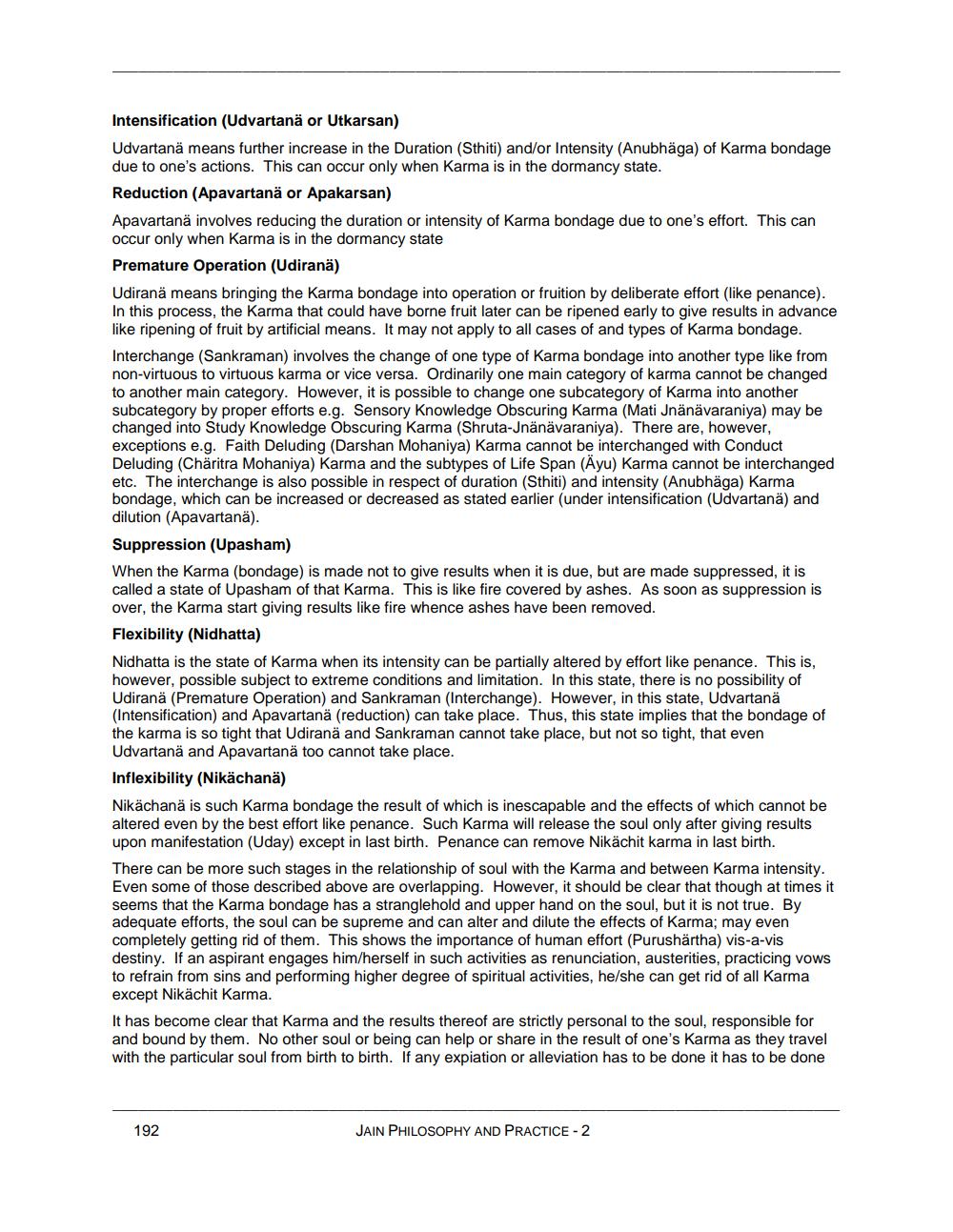________________
Intensification (Udvartanä or Utkarsan)
Udvartanä means further increase in the Duration (Sthiti) and/or Intensity (Anubhäga) of Karma bondage due to one's actions. This can occur only when Karma is in the dormancy state.
Reduction (Apavartanä or Apakarsan)
Apavartanä involves reducing the duration or intensity of Karma bondage due to one's effort. This can occur only when Karma is in the dormancy state
Premature Operation (Udiranä)
Udiranä means bringing the Karma bondage into operation or fruition by deliberate effort (like penance). In this process, the Karma that could have borne fruit later can be ripened early to give results in advance like ripening of fruit by artificial means. It may not apply to all cases of and types of Karma bondage. Interchange (Sankraman) involves the change of one type of Karma bondage into another type like from non-virtuous to virtuous karma or vice versa. Ordinarily one main category of karma cannot be changed to another main category. However, it is possible to change one subcategory of Karma into another subcategory by proper efforts e.g. Sensory Knowledge Obscuring Karma (Mati Jnänävaraniya) may be changed into Study Knowledge Obscuring Karma (Shruta-Jnänävaraniya). There are, however, exceptions e.g. Faith Deluding (Darshan Mohaniya) Karma cannot be interchanged with Conduct Deluding (Chäritra Mohaniya) Karma and the subtypes of Life Span (Äyu) Karma cannot be interchanged etc. The interchange is also possible in respect of duration (Sthiti) and intensity (Anubhäga) Karma bondage, which can be increased or decreased as stated earlier (under intensification (Udvartanä) and dilution (Apavartana).
Suppression (Upasham)
When the Karma (bondage) is made not to give results when it is due, but are made suppressed, it is called a state of Upasham of that Karma. This is like fire covered by ashes. As soon as suppression is over, the Karma start giving results like fire whence ashes have been removed.
Flexibility (Nidhatta)
Nidhatta is the state of Karma when its intensity can be partially altered by effort like penance. This is, however, possible subject to extreme conditions and limitation. In this state, there is no possibility of Udiranä (Premature Operation) and Sankraman (Interchange). However, in this state, Udvartanä (Intensification) and Apavartanä (reduction) can take place. Thus, this state implies that the bondage of the karma is so tight that Udiranä and Sankraman cannot take place, but not so tight, that even Udvartanä and Apavartanä too cannot take place.
Inflexibility (Nikachanā)
Nikächanä is such Karma bondage the result of which is inescapable and the effects of which cannot be altered even by the best effort like penance. Such Karma will release the soul only after giving results upon manifestation (Uday) except in last birth. Penance can remove Nikächit karma in last birth.
There can be more such stages in the relationship of soul with the Karma and between Karma intensity. Even some of those described above are overlapping. However, it should be clear that though at times it seems that the Karma bondage has a stranglehold and upper hand on the soul, but it is not true. By adequate efforts, the soul can be supreme and can alter and dilute the effects of Karma; may even completely getting rid of them. This shows the importance of human effort (Purushärtha) vis-a-vis destiny. If an aspirant engages him/herself in such activities as renunciation, austerities, practicing vows to refrain from sins and performing higher degree of spiritual activities, he/she can get rid of all Karma except Nikächit Karma.
It has become clear that Karma and the results thereof are strictly personal to the soul, responsible for and bound by them. No other soul or being can help or share in the result of one's Karma as they travel with the particular soul from birth to birth. If any expiation or alleviation has to be done it has to be done
192
JAIN PHILOSOPHY AND PRACTICE - 2




